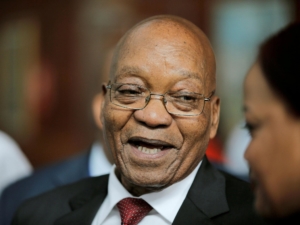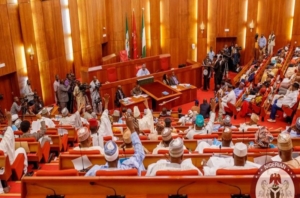Nigerian singer Alizee and 4-year-old daughter reportedly murdered by her Italian husband
No Comments 5968 Views | by zeegee
Nigerian singer Ali Zainab Nielsen popularly known as Alizee was reportedly murdered yesterday, April 5th, along with her 4-year old daughter, Petra Nielsen.
LIB reports that they were both allegedly murdered by her Italian husband Peter Nielsen at their home at Ocean Parade towers in Banana Island.
Speaking to LIB, a member of Alizee’s management team said:
“It’s really a shocking and sad development. We all woke up to the sad news of her death this morning and to find out that the homicide was committed by her husband makes it all the more sad. The Police has been brought in to the case and we’ll share more details as we get them.”
The circumstances leading to her death still haven’t been revealed but the bodies of Alizee and her daughter have been deposited at the mortuary while the police continue with their investigation.
South Africa’s ex-president Zuma, appears in court to face corruption charges
No Comments 5538 Views | by zeegee
A former South African president, Jacob Zuma, appeared in court on Friday to face corruption charges relating to a $2.5 billion arms deal.
The 75-year-old, whose scandal-plagued nine years in office were marked by economic stagnation and credit downgrades, faces 16 charges including fraud, racketeering and money laundering.
Mr Zuma denies any wrongdoing and is challenging the decision to prosecute the case, a dramatic development on a continent where political leaders are rarely held to account for their actions before the law.
Wearing a dark suit, a smiling Mr Zuma waved to crowds of supporters and reporters as he mounted the steps of the High Court in Durban shortly before 0700 GMT.
The speed with which prosecutors have booked his day in court is a sign of the loss of control Mr Zuma has suffered since his successor, Cyril Ramaphosa, became head of the ruling African National Congress (ANC) in December.
However, Mr Zuma still retains some popular support, especially in his home province of KwaZulu-Natal, where the case is being heard.
Heavily armed police in riot gear lined the square outside the court, as thousands of Mr Zuma’s supporters gathered to express solidarity with a leader they say is the victim of a politically motivated witchhunt.
Marchers, many clad in the distinctive yellow, green and black of the ANC, carried placards reading “Hands off Zuma” and performed the high-stepping toyi-toyi protest dance made popular in South Africa’s decades-long struggle against apartheid.
Businessman Siya Khoza said he admired Mr Zuma’s determination to bring in economic policies that he said were designed to spread the wealth in what remains one of the world’s most unequal societies.
“Whatever happens we will still support Zuma because we believe he brought us radical economic transformation and we still believe that him being in the ANC he will push for it,” said Khoza, wearing a waistcoat emblazoned in
ANC colors.
Mr Zuma’ son, Edward, told supporters at nearby park where several thousand people held an overnight vigil that his father was not worried.
“I would want to believe that as an innocent man, he is definitely not worried,” the domestic News24 agency quoted Edward Zuma as saying.
Mr Zuma, who was forced to resign by the ANC last month, was at the center of a 1990s deal to buy billions of dollars of European military hardware to upgrade South Africa’s post-apartheid armed forces.
The deal was mired in scandal and controversy from the start, with many inside and outside the ANC questioning the spending given the massive social issues, from health to education, Nelson Mandela’s party had to address after coming to power in 1994.
Fallout has cast a shadow over South African politics ever since. Mr Zuma was deputy president at the time. Schabir Shaikh, his former financial adviser, was found guilty and jailed in 2005 for trying to solicit bribes for Mr Zuma from a subsidiary of French arms company Thales.
The company is facing charges in the same case.
Charges against Mr Zuma were filed but then set aside by the National Prosecuting Authority shortly before he successfully ran for president in 2009.
The charges were re-instated in 2016.
Since his election nine years ago, his opponents have fought a lengthy legal battle to have the charges reinstated.
Nigerian Senate rejects N800m security vote for Inland Waterways
No Comments 583 Views | by zeegee
The Nigerian Senate, yesterday, queried the sum of N800 million budgeted for the purchase of security equipment by the Nigeria Inland Waterways Authority (NIWA).
The lawmakers made its position to the Acting Managing Director, Danladi Ibrahim, when he appeared before the Senate Committee on Marine Transport to defend the agency’s 2018 budget.
The panel wondered why the agency requested for N800 million in the 2018 budget for the purchase of security equipment, which was the same amount it received in the 2017 budget for the same purpose.
The committee noted that out of the N800 million, the agency had spent N790 million in 2017, which amounts to over 90 per cent of the appropriated sum.
Chairman of the committee, Senator Ahmed Sani Yerima, noted that the agency failed to provide details and specifications of how it plans to spend the money it requested for in the 2018 budget.
Yerima noted: “You said you want to do something; the same amount last year, the same amount this year. There are no details, no explanations, no form of specification whatsoever. This is unacceptable.”
Another member of the committee, Senator Mohammed Hassan, said Ibrahim and his team should be asked to go back and do the right thing.
He said: “You are doing construction, the locations are not known. You have a project of N1.2 billion which you requested for in 2017, you have received over 90 per cent, you requested for the same amount in 2018. The right thing should have been for you to request for the balance.”
On his part, NIWA boss told the committee that the security equipment was not meant for one place alone. He also said the 2017 approval was the first time the authority was receiving fund for capital projects.
The committee, thereafter, asked the representatives of the agency to go back and do the right thing.
Muslim Lawyers vow not to obey dress code in court
No Comments 5801 Views | by zeegee
The Muslim Lawyers’ Association of Nigeria, MULAN, has vowed to reject the new directive given by the High Court of the Federal Capital Territory, Abuja on lawyers’ dress code.
MULAN said the FCT High Court had in a press release on March 28, 2018 “prohibited the use of any apparel underneath wigs by lawyers and by extension the hijab by female Muslim lawyers.”
But in a communiqué generated at the end of its National Executive Committee meeting in Benin, Edo State, on April 3, 2018, MULAN said it would not adhere to the directive.
It described the directive as “unfortunate, draconian, illegal, unconstitutional and unlawful.”
The MULAN communiqué was signed by its President, Dr. Kamal Dawud.
It argued that the directive by the court was at variance with Section 38 of the constitution, which guarantees citizens’ right to manifest their religion.
It added that the court’s decision was “contrary to the 2004 resolution of the Body of Benchers which allows female Law School students and legal practitioners to use head cover underneath their wigs.”
“MULAN NEC condemns the directive in the press release in the strongest term and urges the FCT High Court to reverse its decision contained in the press release forthwith,” the communiqué said.
